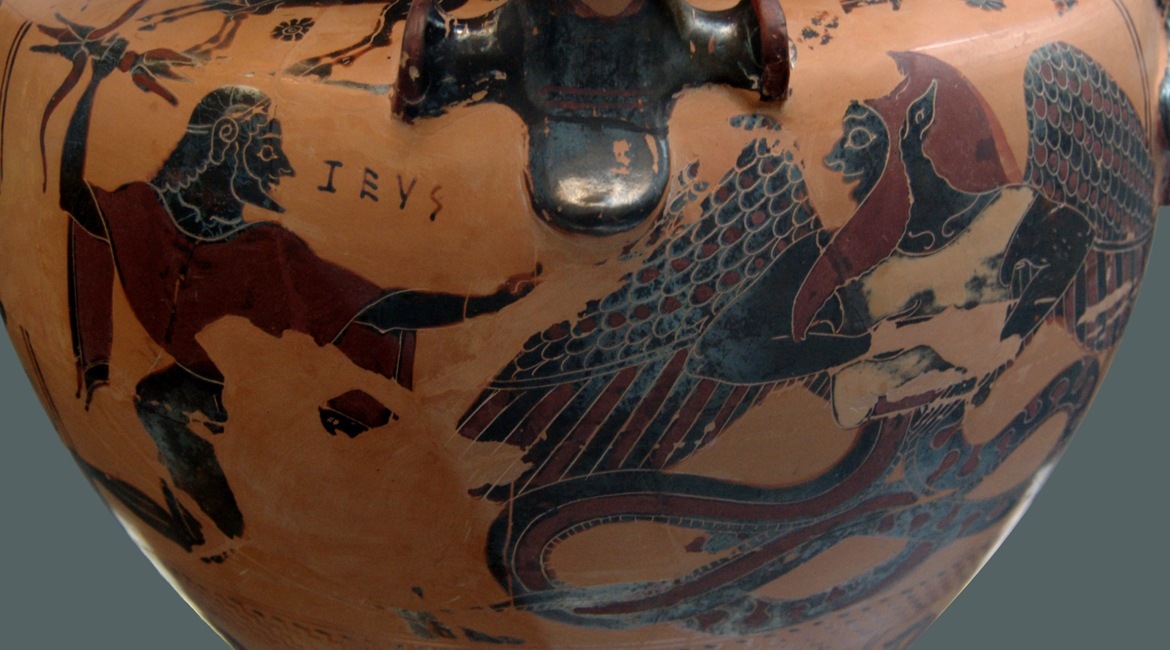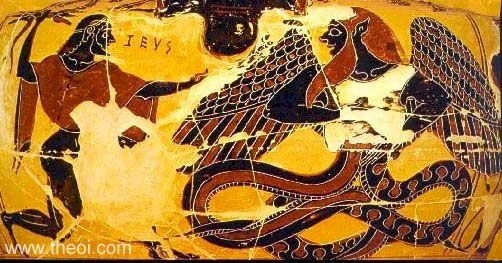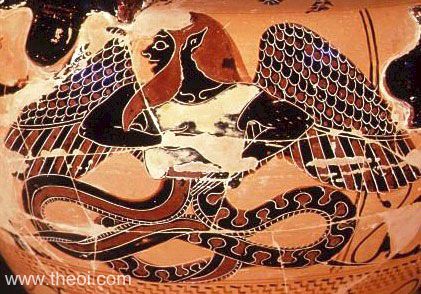
The Greek god Typhon ((/ˈtaɪfən/; Ancient Greek: Τυφῶν, Tuphōn, [typʰɔ̂ːn]), also Typhoeus (Τυφωεύς, Tuphōeus), Typhaon (Τυφάων, Tuphaōn) or Typhos (Τυφώς, Tuphōs) was the most deadly monster of Greek mythology. Wiki describes him as follows;

*************
Typhon was described in pseudo-Apollodorus, Bibliotheke, as the largest and most fearsome of all creatures. His human upper half reached as high as the stars, and his hands reached east and west. Instead of a human head, a hundred dragon heads erupted from his neck and shoulders (some, however, depict him as having a human head, with the dragon heads replacing the fingers on his hands). His bottom half consisted of gigantic viper coils that could reach the top of his head when stretched out and constantly made a hissing noise. His whole body was covered in wings, and fire flashed from his eyes, striking fear even into the Olympians
*************
This description clearly describes a tornado or waterspout. Clues regards "upper half reaches the stars," "bottom half consisted of gigantic viper coils, which "made a hissing noise." The ciLuba language brings clarity to this term.
Τυφώς, Tuphōs: The U in the Greek is pronounced Y > Typho- (/Tyfo-, Tyfu-, Typu-, typo-,). In ciLuba, Cipùpu (mpuupija) means "storm, hurricane, tornado, strong wind, violent storm.; disaster." A variant, ciFufu means "to plot, plot" (< ciFua). The word ciFwe adds to the meaning "what is dead" and diFwa "dead." The variant chosen by the Greeks is Tshipupu or Typupo which can refer to a moral and physical destruction [public calamity, disaster]. We know this root in the Egyptian name for the god /aApp/ "Apep, Apophis" which should actually be /a-l-p-p/ (ciLuba lupeepèlè(à) "wind"). To linguistically confirm:
Egyptian: ppt "a plant"
ciLuba: cipùpù "foliage" (pp.t > t.pp) [Egyptian -t suffix is prefixed in ciLuba as ci-).
The online etymological dictionary has the following entry for Typhon:
Tiphon "violent storm, whirlwind, tornado," 1550s, from Greek typhon "whirlwind," personified as a giant, father of the winds, perhaps from typhein "to smoke" (cf. typhus).
Again, when they don't have an Indo-European root, they make up fancy etymologies. Africa is usually always the source. This is why you don't discount the Greeks when pronouncing Egyptian words and for information about Egyptian society. Oh, and the reason why Typhon is painted black is because he represented "storm-clouds." This is a typical African association (especially among Nilo-Saharans). The god "Apep" (lupeepèlè(à)) among the Egyptians is the "violent winds" that move creation forward that threatens the boat of Ra (entropy). Remember Typhon is supposed to be the associated with Set of Egypt. Also remember that Set is a god of "storms" as well. We end with more variations of the p-p root.
ciLuba: pee "wind"; -peepa "blow hard, be impetuous; shake in the wind; blow"; cipeepè(à) "wind"; lupeepèlè(à) "wind"; cipeepèlè(à) "violent wind, storm"
APEP

Typhon

http://images2.wikia.nocookie.net/__cb20120809171336/mythology/images/a/a8/Typhon.jpg
Asar Imhotep
www.asarimhotep.com


